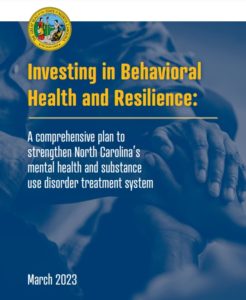
Special to Iredell Free News
RALEIGH — Gov. Roy Cooper on Wednesday released a comprehensive plan to invest $1 billion in addressing North Carolina’s mental health and substance use crisis, including anxiety and depression rates that have almost quadrupled, overdose deaths that have jumped 72 percent and youth suicide rates that have doubled.
“Our mental health system is under significant stress and in need of major investments to make sure every family, student and North Carolinian can get critical care,” Cooper explained. “This plan tackles the ongoing mental health crisis in a direct and meaningful way by investing in the whole-person health of North Carolinians. It will empower workplaces, schools, and local governments in search of more ways to help their communities and most importantly, it will save lives.”
The plan outlines three areas for investment in the continuum of behavioral health care:
♦ Making behavioral health services more available when and where people need them;
♦ Building strong systems to support people in crisis and people with complex behavioral needs; and
♦ Enabling better health access and outcomes with data and technology.
Woven throughout the plan are elements to support the behavioral health workforce, which is critical to the plan’s success.
In his State of the State address on March 6, Cooper highlighted the importance of investing in mental health. The governor’s budget proposal will be released in the coming days and will include the investments detailed in the Mental Health Plan.
“Our behavioral health system has been under-resourced for decades, and this plan begins to address these long-standing needs,” said NCDHHS Kody H. Kinsley. “Behavioral health is key to health. This investment will ensure that every child and adult in North Carolina can get the help or treatment that they need, when and where they need it.”
The key investments detailed in the report break down are:
♦ Make behavioral health services more available when and where people need them.
♦ Raise Medicaid reimbursement rates for behavioral health services ($225 million) – Reimbursement rates have not been updated since 2013 and do not reflect the current cost of providing care. This means medical practitioners don’t have enough to cover costs and may have to close.
♦ Improve access to routine, integrated care in communities and schools ($175 million) – Invest in behavioral health alongside physical health services provided through primary care, schools and clinics. Educate the public to reduce stigma of mental health treatment.
♦ Address the intersection of the behavioral health and justice systems ($150 million) – Help those leaving jails transition back to the community, increase jail-based programs that restore mental capacity for trial, and provide resources to judges who determine when other services may help.
♦ Build strong systems to support people in crisis and people with complex needs
♦ Build a strong statewide behavioral health crisis system ($200 million) – Housing supports, mobile crisis teams, and better services in drop-in clinics are among the recommendations in this section.
♦ Transform child welfare and family well-being ($100 million) – Safe and stable homes are needed when children with complex behavioral needs enter child welfare services. Community supports and foster homes are critical.
♦ Create sustainable hospitalization and step-down options ($100 million) – Demands for in-patient treatment are higher, while staffing has reduced the number of available beds. In addition to supporting the workforce, step down facilities will open more beds, delivering urgently needed care more quickly.
♦ Enable better health access and outcomes with data and technology ($50 million) – Telehealth in rural communities, better tracking for psychiatric beds, and increasing use of electronic health records will help give North Carolinians seamless access to behavioral health treatment.
Learn More
The plan is available online HERE.





That’s awesome. I reside in Statesville, and it is very very important to get the help I need. I overdosed last year due to depression.